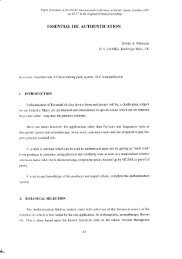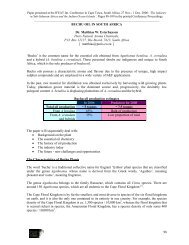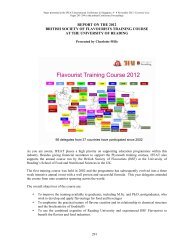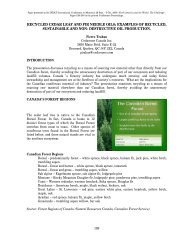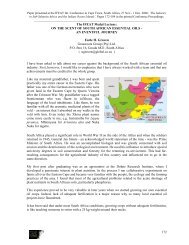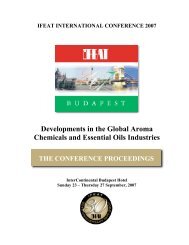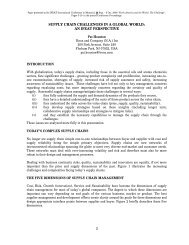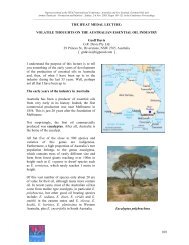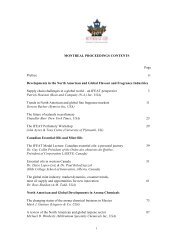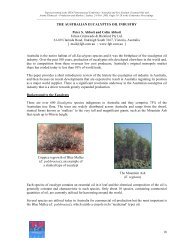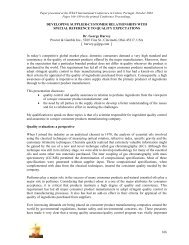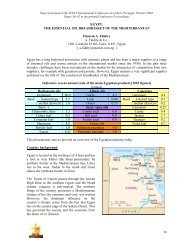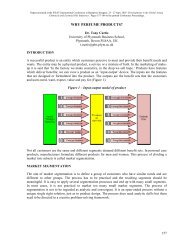Create successful ePaper yourself
Turn your PDF publications into a flip-book with our unique Google optimized e-Paper software.
drying and processing. With considerable charm and with open hearted hospitality, the Co-opManager and his family invited the group to enjoy somesplendid food and take away samples of the Co-op'sproducts. Everyone seemed pleased with the visit. It wasrural Egypt at its very best.One of the remarkable aspects of this tour was theintimate introduction to rural life in the Nile Delta. Thenarrow roads meandered through small towns andvillages, past hundreds of small verdant farms in apicture book setting of palms, busy people and animals -and abundant harvests. It made a lasting and dramaticimpression on the group and a wonderful impression ofthe real Egypt and its people.Dressed for the occasionFayoum Organic Co-operativeWhile it was a wonderful drive through this part of the Delta, the narrow roads, edge to edge farmsand oddly shaped bridges eventually became a major obstacle for the over-sized...for the job…tourbus. It was a marvellous bus, just a bit big. The driver was outstanding and extremely patient witheveryone giving him advice at the same time, including the amazed onlookers. It was probably the firsttime that a vehicle of that size had ever been in some of the villages. It was a wonderful day albeitlong, tiring and a lot of driving and ended well with dinner, a glass or two of Rubbayyat Red and anovernight stay at the somewhat surprising 'Auberge du Lac'. Worth a visit.In a somewhat smaller, more manoeuvrable bus, westarted the second day near Beni-Suef at Fridal'simpressive almost- complete production facilities.Probably complete by now, these facilities will allowcontinuous processing of herbs, primarily – youguessed it - parsley, and other herbs, from freshlyharvested, through washing, cleaning, steampasteurisation, drying and packaging, with herbs beingdelivered from outlying growing areas including DivaFarms. Very impressive.Small scale co-operatives Located near these new facilities is the importantgeranium growing area that provides some 95% of theEgyptian geranium oil output. There are between 30–40 co-operative-owned distilleries suppliedmainly by small-scale farming operations, with larger companies purchasing oils on a contract basis.The estimated geranium oil production for 2007/2008 is very substantial at between 80-100 tonsWe visited an operating co-operativedistillation unit which was one ofmany highlights of the study tour. Itwas a very festive occasion thatattracted a fair crowd from the nearbyfarmers and contract growers and wewere even treated to ice cold cocacolaby our hosts.Oil-fired boilers and a festive atmosphere176
Leaving behind the small-scale farmers and co-op-owned distillation facilities, the programme shiftedto Fridal's substantial essential oil and concrete production facility and existing herb processing plant.Tagetes was 'in the pot' and freshly harvested curly parsley was being processed, from cleaningthrough to drying and packing. A busy factory with plenty on-going all at once.Back in Cairo, we enjoyed some of the delights of the other side of the tour – all so well organised intothe programme…namely the famed Rubbayyat Restaurant in the restored and very impressive andextravagant Mena Palace near the Giza Pyramids. An evening of dinner, dancers, crooners, extremelyenergetic traditional Egyptian music and the inevitable Whirling Dervish. I don't know how thesepeople do this. I would be ill! All of this was happily washed down with some more wonderfulRubbayyat Red! An Egyptian secret.Day Three saw us in Kalioubeyya to visit the fields and factory of Hashem Brothers. The HashemBrothers family partnership was established in 1974, with the essential oils and aromatic productsdivision being formed in 1994. Today, Hashem Brothers is one of the foremost producers of oils andaromatics products in Egypt with a range of nearly 50 quality essential oils, concretes and absolutes.Before the tour, for most of us 'Jasmine and Egypt' weresynonymous. After the trip, we will never forget jasmine andEgypt! It was a special privilege to be present during jasmineharvest and interacting with the jasmine pickers at HashemBrothers. Happy pickers enjoying their task and our company.There was a great deal of ululating going on which reallyimpressed Yasuko Inoue who tried to do it, veryunsuccessfully despite the women's enthusiasticencouragement and enjoyment at her efforts. Ululating isundoubtedly difficult or even impossible for a Japanesespeaker. Much fun was had at Yasuko's expense, although shetook to picking jasmine blossoms rather well.Jasmine – the scent of Egypt;Yasuko Inoue picking jasmineIt was a wonderful experience to see the whole process from picking, pickers weighing in, with theirbrimming baskets and the production processes of solvent extraction, concretes and absolutes… not tomention the great lunch and fine Egyptian food.By now, we were beginning to take to this Egyptian food and we had another slap-up meal at thepopular Abu El Sid Restaurant in Cairo in the evening! I can assure you all that we were earning oursuppers despite what you may be thinking. It's a tremendous strain to put away so much good food.Day Four, Wednesday, was yet another interesting day with avisit to Machalico at Gharbeyya, about 100 kms north of Cairoand the agricultural sites at Bassioune and the MachalicoFactory at Mehallah, located alongside the agricultural site.Baskets brimming withjasmine flowersMachalico has an advantage with 60% of its raw materialcomes from its own agricultural sites, producing concretes andabsolutes of a wide range of flowers including jasmine,marigold, carnation, bitter orange, geranium and cassia, amongothers. Agreements with small geranium producers in Beni-Suef provide for approximately 20 tons of geranium oil peryear.177
The Bassioune site was in an idyllic setting of datepalms waving in the breeze with bitter orange treeslining the roadways and violets forming a carpet underthe palms. Delightful environment, well ordered andneat.We followed a very energetic and enthusiastic Dr ElsayedMachaly around the farm … at breakneck speedI might add, especially considering the fact that he hada serious limp and we 'younger ones' had a timeMachalico’s Bassioune Farm keeping up – visiting the fields, pickers, carnation andviolet leaf harvest and weigh-in before following theraw material making its way through the fully-operationalproduction facility coping with different products simultaneouslyand good exposure to the production of concretes.All in all, a well organised farm and impressive productionfacilities. Dr Magued Machaly's daughter, Ayat…meaning LittleMiracle…had co-ordinated another superb sit-down lunch,rounded off with the most outstanding dessert of mixed baklava.While the Tour promotional material spoke of heavy travelling, it Machalico’s Concretesgave no health warning about 'heavy eating' and gut-stretching weight acquisition. But we wereenjoying it and no one was complaining especially after ourthree kilometre speed walk before lunch!We literally 'zoomed' back to Cairo after a great visit toMachalico. It's worth mentioning that the OrganisingCommittee had sorted out Cairo's legendary trafficcongestion. All our trips were comfortable, quick and trafficAyat’s colour co-ordinated Baklava free due primarily to the organisation of escort vehicles,whose drivers made a point of clearing the way ahead for thebus with frequent blasts on the horn and siren. They seemed to enjoy it and we felt like a presidentialmotorcade. I can recommend it.All work and no play makes Jack dull, so still with the social programme we hit the Giza Plateau forthe Sound and Light Show and what turned out to be a highly memorable and thought-provokingevening. The history of Egypt, the Nile and its Pharaohs is indeed the history of civilization. Wewitnessed some breathtaking negotiating skills by Greg Dowles who managed to parlay up the price ofa glass pyramid from the curio sellers before we all headed back to Cairo for yet another memorablemeal in a downtown restaurant.…It's worth noting that a fairly high level of sustainable stamina is a definite requirement for suchtours, although the opportunities for 'partying' per se were rather self-regulated due to the earlydepartures and the long days – just in case you all think that it was all fun, fun and more fun. It wasserious stuff, I can assure you.Day Five and another long drive and a visit to A. Fakhry and Company located north of Tanta in theDelta. Your Chairman of the Tour Organising Committee, Hussein Fakhry, travelled in the bus with usand through a microphone – nice touch - provided an enlightened commentary and insight into Egypt,178
its history, its agriculture, its demographics and its opportunities and threats. He was very open andforthright in his comments and raised some contentious issues that currently affect and will affect theEgyptian industry in the future, such as injudicious use of water, water shortage, pollution, productionissues and quality. It was refreshingly honest and candid.Hussein was able to pull together the various elements and visits so that by the time the bus hadarrived at the Fakhry establishment, many loose ends had been neatly tied, leaving everyone with athorough overall understanding of the Egyptian Essential Oils Industry.A Fakhry and Company has been involved in essential oils andextracts since 1955 and is fully and demonstratably committedto working with an environmentally-friendly/organicemphasis. Its activities are organised around a nucleus of 65hectares of fields planted with some 50 varieties of organicallycertified aromatic crops. This organic nucleus as well as aconventional farming network of over 1,000 hectares gives theCompany considerable advantage and is able to produceapproximately 130 different variously-certified naturals,including essences, essential oils, hydrolats, concretes,absolutes, waxes and a number of specialty fresh and driedbotanicals.Environmentally friendlytransport on Fakhry Farm with‘Hummer’ the muleHussein Fakhry outliningactivities before a high speedwalk around the farm to workoff the baklavaIt was a wonderfulvisit. Each visit hadbeen different and each with its own characteristics and'personality'. And so it was with the Fakhry establishment.There was much evidence of a sincere and total commitmentto organic production.A well-co-ordinated experience of fields, nursery,composting, harvest, transport, production and sensoryevaluation of the end product – in a charming setting under aspreading grape vine, to the haunting accompaniment of anEgyptian version of a horizontal harp (I was told the name butcannot remember it I'm afraid) and ice-cold refreshments and dare I say it – another splendid lunch,taken al fresco along the banks of the Nile tributary.Hussein Fakhry describes his activities as "'doing different things and doing things differently". That'sfor sure!Back to Cairo for the final event of the programme - a farewell dinner on the Nile Pharaoh, anelaborate 'Cleopatra-style' barge that cruised up and down the Nile while we chatted and enjoyed foodand refreshments, with a band and floor show and a few simple-minded members of the tour party -press-ganged by the Organising Committee no less - displaying their complete lack of talent at bellydancingunder the tutelage of a – ahem – gorgeous looking teacher with great - ahem – eyes, except forone member of the group who showed remarkable talent and for reasons of anonymity and potentialtrouble at home, won't be mentioned, with payment of a small fee of course.179
On a serious note and in conclusion:! The tour was an invaluable learning experience;! It provided a clear picture of the diversity, sophistication, range and quality of aromaticproducts and production facilities available from Egypt;! There will be good commercial spin-offs from the group's exposure to the Egyptian essentialoils industry and vice versa;! There will be valuable lessons that the group members take back to enrich their ownendeavours. (As a previous speaker, Tony Curtis, remarked in his address - "Adding value tothe individual is adding value to firm and the industry". Never a truer statement with regard tothis study tour to Egypt. I can certainly speak for myself and I'm sure the others would agree).! Attending the Study Tour satisfied a long-held wish of most of the delegates who wereunfamiliar with the Egyptian industry and were able to see and experience it first hand and indetail.One should not under-estimate the amount of work required to organise such a programme.Grateful thanks are due to your Committee for a superbly organised and executed programme thatmore than satisfied… and without exception, all the members of the group left Egypt very satisfiedwith the tour, the organisation thereof and no doubt fond memories of friendship, fellowship,hospitality, good humour, generosity and enthusiasm of all those involved. And it will be good forbusiness, I'm sure of that.Most significantly, the genuine willingness of the Egyptian essential oil industry's leading members toshare their knowledge and experience underpinned the success of the tour.The very able Programme Co-ordinator, Chérifa Fakhry gave a gift to each member of the group of abeautiful silver "Key of Life' or 'ANKH', the symbol of Egypt. It was a fitting gift as a reminder of anoutstanding and memorable study tour. Perhaps it would make a good brand or symbol for EgyptianNatural Products – A key to the other side of Egypt - a vibrant and fragrant side of Egypt with agrowing and undoubted potential to become the world leader in essential oil production?After all, they have been at it for thousands of years so why not? Earlier today, we heard Dr Hans vanBergen talking about how bemused and troubled Cleopatra would have been at all of the 'REACH'issues. I would suggest that Cleopatra would have been well pleased with this Study tour and theshape of the Egyptian essential oils industry.Finally …as mentioned at the beginning of this address to you, I referred to the organising Chairman'sintroductory remarks at the welcoming function in the Cleopatra room at the Conrad Hotel. HusseinFakhry stressed that companies and individuals spend a very considerable amount of money attendingsuch tours and therefore want to see a return on their investment. That goal has certainly beenachieved and I would urge the industry to send your people on future study tours. It's great investmentwith long term benefits.180
On a very final note, I don't think we will ever smell jasmineagain without thinking of Egypt, its essential oils industry,the people we met and the wonderful experiences we had.However, to experience some different Egyptian aromas andget the Jasmine out of my nose briefly, I headed for the GizaPlateau and rented a rather smelly and moth-eaten camel,paying extra for a quick whip around the Pyramids.We will never smell jasmine againwithout thinking of EgyptThe miserable bastard wouldn't budge despite twisting itsear and yelling.How do you say 'MUSH!!' in Arabic?To get the jasmine out of my nose…Thank you to all those involved in this Study Tour. It was outstanding! I will definitely be booking forthe next one!Ian Mclean was educated in Zimbabwe and South Africa, graduating from theUniversity of Cape Town in 1977. He has been active in ‘natural andorganic’ agriculture for many years with a more recent focus on theestablishment of essential oil and other plant extract production platforms insub-Saharan Africa, emphasising ‘triple bottom line’ sustainability, organiccultivation, fair and ethical trade. He has considerable experience in agribusinessand agro-industrial enterprise development, value-addedprocessing, organic agriculture, special crops and international marketing.He lives in Cape Town, South Africa.181



